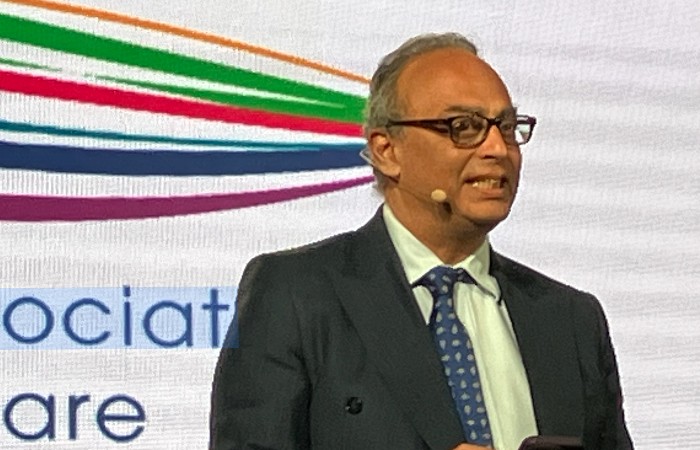News

NAPC president: We will never have aligned national contracts
In News
Bookmark
Record learning outcomes
The president of the National Association of Primary Care, Ash Soni, has said the interests of individual primary care professions will prevent aligned national contracts from ever happening and urged community pharmacists to focus on “collaborative, local contracts” within integrated care system areas in England.
Soni (pictured) told the Sigma conference in South Africa last week that although national contracts “will always be there” because leadership organisations representing general practice, community pharmacy, dentistry and other professions will never “be prepared to completely let it go”, the opportunity for pharmacy is at local level.
“Collaboration is the key. Integration is what we want to do. But actually, what’s clear to me from day one, is that at (national) level, there is no collaboration. I love the idea of aligned contracts, I think it’s the right thing to do but it will never happen because at that level, each of the organisations, each of the professions, is after what they can get for themselves,” he said.
“That’s about themselves. Maybe I’m wrong, but I don’t believe we will get collaborative contracts at national level. That’s a way of saying ‘that’s beyond my pay grade; I can’t do anything about that.’
“My hope is, and my trust in Community Pharmacy England and all of our national bodies, is that they create an environment where we have sustainable national contracts which will at least make sure that what I do, I do and don’t make a loss. And I’m not funding that service on behalf of the NHS.”
Mr Soni, who is a non-executive director on NHS Sussex Integrated Care Board, warned pharmacists not to get fixated with representation on ICBs, which he said will “bring nothing” from a “pharmacist’s perspective”. The key for pharmacy, he insisted, was to collaborate “at a local level; at primary care network, neighbourhood and team level” alongside integrated care systems.
“We have the primary care contracts. We have a GP contract, we’ve got a pharmacy contract, we’ve got a dental contract, an optometry contract, local authority funding community services and we’ve got the voluntary sector being funded from somewhere,” he said.
“But (pharmacy’s) opportunity at local level becomes, with an ICS, how you place a single, collaborative, local contract based on outcomes. So, you do the national stuff that you’re required to do. Think about who does that within your business and how you operate it.
“But then what you do is work collaboratively together. It’s like taking a PCN on steroids and saying ‘ok, if we work together and deliver better outcomes (for our patients)’ then we can go to the ICB and say ‘you’re buying stuff. What we’d like you to do is to buy this because this is the outcome that we will get from it.’
“But that’s a collective contract. The collaboration, the behaviour, is you all have to work together, otherwise you won’t achieve this.”
Soni said PCNs “will probably morph into neighbourhood teams at some point,” by which time pharmacists “as individuals will start to have conversations across neighbourhoods about how you can collaborate to deliver better outcomes.”
Tapping into ICBs’ budgets
Using Sussex as an example of how pharmacists can tap into ICB budgets and make the most of opportunities at local level, he said: “The total budget in Sussex is £3.1 billion serving 1.7 million people. Pharmacy’s share of that, primary care’s share of that, is about 10 per cent.
“That means 90 per cent of that is going into secondary care and acute services. But if we can reduce the number of people ending up in acute care, we have achieved something that will then deliver the value and produce the income.
“It’s not just about primary prevention; it’s about secondary prevention. We sometimes lose sight of secondary prevention. And it’s about proactive care rather than just prevention.”
Soni encouraged pharmacists to look at their ICB’s minutes which contain their “medium term financial plan”.
“(There has been talk) about an £80 billion deficit this year. We in Sussex are currently looking at about £16.5 million. Look at that medium term financial plan and the expectations around growth, demand and need and the consequence that will have, inflationary pressures and anything else thrown into the pot. The NHS will be short by about £6.5 billion currently, so they need to transform,” he said.
Insisting all 42 ICBs in England have written their strategies and five-year plans, Mr Soni told delegates. “Your job is to think about what it is in that strategy that I can work with colleagues to be able to help with change.”

